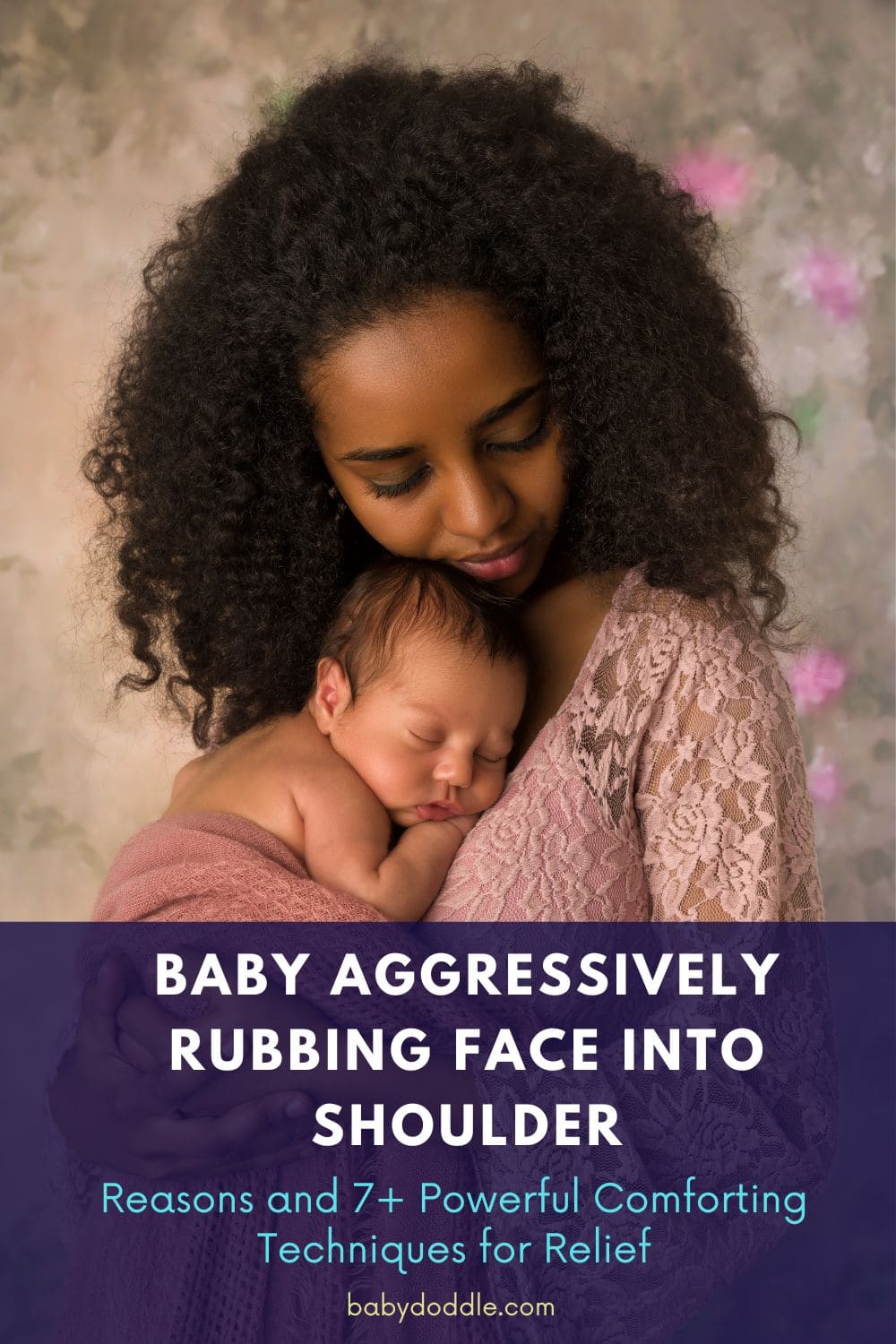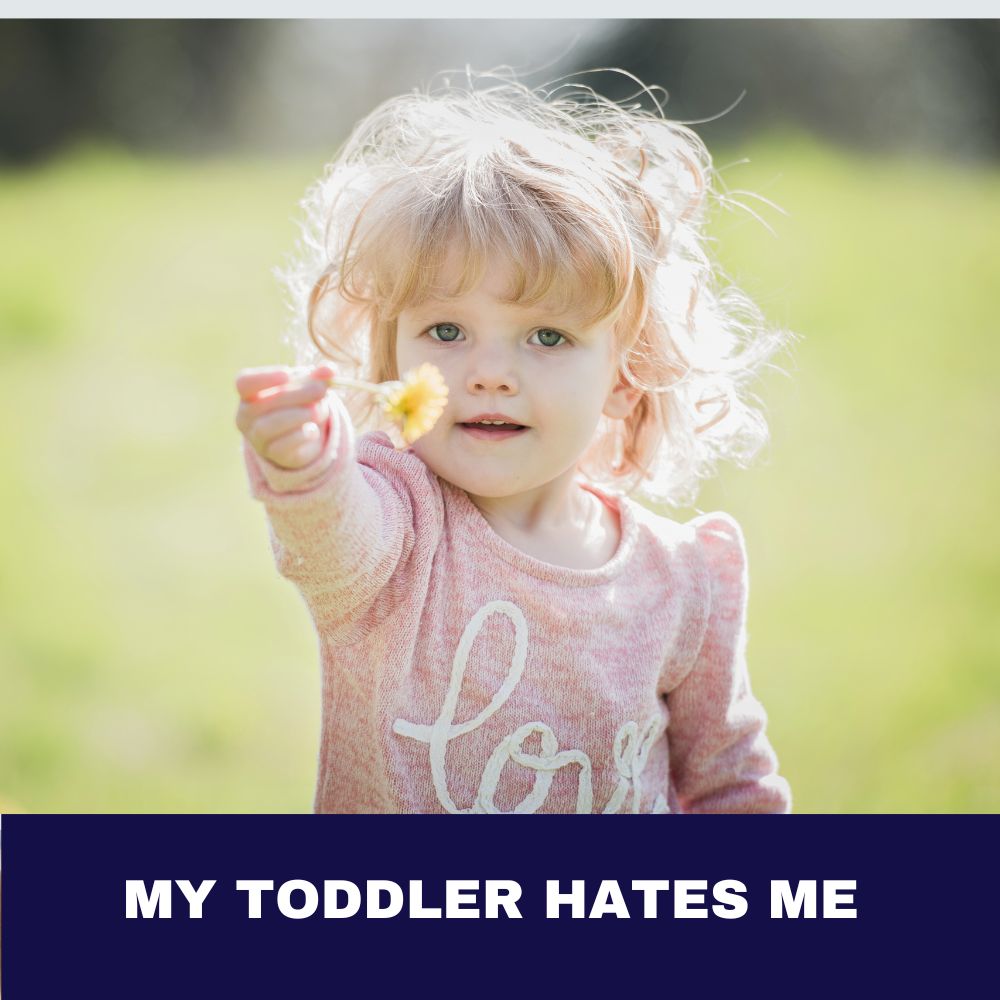As a new parent, few things can be more distressing than when your little one begins forcefully grinding or rubbing their face on your shoulder, often accompanied by tears or cries. This intense facial rubbing can seem aggressive at times, leaving you worried about their discomfort and unsure how to provide relief.
Take comfort in knowing that this behavior, while understandably alarming, is relatively common among babies as they navigate a world filled with new sensations. Getting insight into the potential reasons behind it and having some soothing techniques in your parenting toolkit can go a long way toward finding a gentle solution.

Why Does My Baby Furiously Rub Their Face on My Shoulder?
Babies have not yet developed more nuanced ways of communicating their needs and surroundings to us through speech and language. Face rubbing against caregiver’s bodies, often centered on the chest or shoulder area, can actually serve as an important sensory feedback mechanism for infants.
It allows them to take in the information around them through touch, smell, and physical closeness. This response kicks in automatically, dating back to primitive infant survival needs. Beyond just sensory intake though, vigorous face rubbing or nuzzling behaviors in babies can signify some specific underlying causes.
Seeking Warmth and Familiarity
Babies derive great comfort, security, and regulation of their nervous systems through skin-to-skin contact with caregivers. Rubbing against a trusted shoulder transports them back to the intimacy experienced in the womb surrounded by protective bodies.
Your familiar smell, heartbeat rhythm and shoulder texture when cheek-to-cheek offer deep-rooted reassurance for babies when they are feeling out of sorts. Think of it like their version of getting a warm hug when having a bad day! This innate desire for familiarity sparks face nuzzling as they seek further closeness.
Fatigue and Overstimulation
The cycles of noisy alertness followed by deep sleeping states are important for babies’ development and growth but can leave them prone to easy overstimulation and tiredness. Gentle face rubbing against shoulders is their way of self-soothing when they have hit their threshold and need to recharge.
The rhythmic motions combined with the comforting shoulder stimuli help trigger the relaxation response in their bodies. It is an early regulatory technique to initiate the calming process before napping or sleeping. With limited communication ability, pushing their face forcefully into a shoulder is a baby’s signal they desperately need a time-out.
Teething Discomfort
The pressure felt when firmly grinding facial muscles and gums on shoulders can temporarily counteract the swelling and throbbing sensations associated with teething. If the vigorous rubbing is accompanied by drooling or mouthing behaviors, teething could very well be the culprit.
Providing opportunities to gnaw or massage swollen gums on trusted shoulders soothes local pain for babies. The familiar contact is also reassuring amidst the discomforts of emerging teeth, allowing the body to release its own pain-relieving endorphins.
General Fussiness or Distress
Babies have good days and bad days too! Growth spurts, digestive discomforts like gas, nasal stuffiness, itchy skin or simply feeling out of sorts emotionally can all send babies into restless irritation. Using shoulder friction to address distressing but less defined sensations provides a measure of relief your baby instincts reach for in the moment.
Think of it as their version of tossing and turning to get more comfortable – pushing against a shoulder hopefully resets an uncomfortable body and state of mind. Touch and vigorous movement integrate in search of emotional as well as physical stability.
| Reason | Signs | How to Soothe |
|---|---|---|
| Seeking Warmth & Familiarity | Rubbing increases when baby seems unsure/overwhelmed | Increase skin-to-skin contact |
| Fatigue/Overstimulation | Intensified rubbing before naps, with yawning | Rock gently holding baby, reduce stimuli |
| Teething Discomfort | Combined with drooling, mouthing | Provide chew toys and frozen cloths |
| General Fussiness | Related to growth spurts, gas, congestion | Check for underlying causes & treat |
Signs This Is a Self-Soothing Ritual
While many episodes of forceful face rubbing are brief, some babies use this mechanism repeatedly and persistently to help regress into calmer states. Recognizing when this is part of your baby’s self-initiated soothing ritual versus random gesturing can help guide your response for supporting them. Signs it is serving a regulatory function include:
- Site-Specific Rubbing: Repeatedly targets one main area – often the shoulder/upper chest rather than random bodily contact.
- Duration: Each rubbing session lasts beyond just a quick gesture, from 30 seconds to several minutes.
- Determination: Baby seems focused, pressing face vigorously into the shoulder with intensity and purpose.
- Lead-Up Cues: This may be preceded by signs of tiredness or inability to settle such as fussing, crying, or yawning.
- Outcomes: Rubbing settles babies, at least temporarily, as crying stops or they drift into calmer or sleepy states.
Recognizing face grinding or nuzzling against shoulders as part of your baby’s repertoire of regulation strategies allows you to support this innate self-soothing capacity. It also helps rule out other concerning explanations when the behavior is centered around rest promotion.

Soothing Techniques During Intense Face Rubbing Sessions
While alarming for parents to witness, understanding the intention behind forceful facial rubbing takes the edge off. Your stress levels also communicate to babies, potentially aggravating their upset. Responding with empathy and techniques that validate their urges reduces distress for both parties.
Match the Pressure: Using your hands to gently apply counter-pressure while the baby forcefully pushes can allow them to access the sensory input they seek. Avoid blocking or restraining them if possible.
Experiment with Positions: Try different holds during rubbing outbreaks to find what makes your baby most comfortable – across your chest, upright on your shoulder, reclined in arms/lap etc.
Balance With Movement: Gently sway, bounce or rock baby at pacing aligned with their rubbing rhythm. The corresponding vestibular stimulation amplifies relaxation.
Remove Sensory Stressors: Transition to a calmer setting by dimming lights, reducing surrounding noise/conversation and eliminating scratchy tags on clothing.
Hydrate Skin: Drool and tears accompanying forceful rubbing can dry out and redden delicate facial skin. Use a damp cloth to wipe clean and gently apply moisture cream.
Tummy Pressure: For lower abdominal discomfort, cradling the baby facedown and applying mild pressure on their stomach may assist with gas relief.
Burping breaks: If rubbing follows feeds, regularly pause for upright burping over your shoulder, then resume the previous position.
Reading the baby’s communication cues takes some time to master for all caregivers. But remember your little one’s world is fresh and exciting as they take it all in during rapid development. Support their efforts to self-regulate even when expressions seem extreme. Your reassuring arms create a safe harbor for them to ride the highs and lows while growing.
| Category | Specific Techniques |
|---|---|
| Touch | Provide counter-pressure, massage gums |
| Positioning | Recline, upright, across chest |
| Movement | Bouncing, swaying, rocking |
| Environment | Reduce stimuli, white noise |
| Hydration | Damp cloths, moisture cream |
| Tummies | Gas drops, warm compress, downward pressure |
Nursing Your Distressed Rubber: Teething Tips and Tricks
While many parents feel unprepared for the unsettled behaviors our once-content little bundles exhibit when teething pain strikes, their distress serves an important purpose. Crying, drooling and even aggressive face rubbing trigger caregiving instincts in us adapted over generations specifically to respond to infant discomfort. Understanding the profound impact of emerging teeth on babies provides the insight we need to comfort them mindfully.
Teething unleashes systemic reactions in babies from swollen gums, tender facial nerves, ear pain, biting reflexes, and even digestive troubles that compound into general misery. The pressing desire to chew and grind down on things spreads inflammatory chemicals that disrupt small bodies. While frozen teethers and numbing gels temporarily cool searing tissues, most babies reflexively seek the soothing powers of caregivers’ touch.
Why Rubbing Replaces Teething Toys
The textural sensation of a familiar shoulder or shirt edge consumed under the pressure of stressed gums and facial muscles offers sensory input precisely where the baby most needs relief. The simple act of biting into fleshy shoulders probably mimicked early breastfeeding comforts when jaws began exercising their power. Something primal calls babies back to sucking motions against caregivers’ bodies amid teething flare-ups.
The warmth and gentle give from trusted chests and shoulders under the rubbing release tension in throbbing nerve bundles. Your rhythmic heartbeat and familiar smell comfort on primal levels when your little one loses equilibrium from systemic teething reactions no toy can replace.
Work With The Chewing Urge
Trying to restrain oral urges often aggravates babies more when teething overrides other senses. Avoid pulling faces away from grazing shoulder nibbles, but do supply appropriate teethers intermittently if possible for safer chewing practice. Freeze cloth teething toys for extra numbing effects.
Lay a receiving blanket folded lengthwise and hold this “chew bar” in place when your little rubber latches onto shoulders for gnawing practice without direct skin contact. Any chance to clamp down on aids relief.
Tune Into Teething Triggers
Pay attention to patterns around when your baby ramps up the rubbing routine. Swollen and sensitive gums peak in late afternoons when saline levels drop. Offer extra snuggle time during this window to compensate for lagging food intake from soreness.
Note if vigorous rubbing escalates after feeding attempts, signaling discomfort swallowing amid jaw tenderness. Adjust nursing positions to support the chin and offer shorter, more frequent feeds.
Track if character changes like unexplained fussing or night waking accompany intensified rubbing sessions so you can validate emotional impacts too. Respond with increased affection and forgiveness for their discomfort.
Balance Pain Management
While medications temporarily override inflammation, babies still seek the innate soothing powers of trusted caregivers amid teething’s assault. Manual gum massage eases localized tensions while your shoulder offers comfort for the systemic distress behind aggressive rubbing urges.
Frozen banana pieces numb tender spots for gentle chewing practice if the baby will take breaks from latching onto you. Quick face cloth compresses calm raging nerves when kids allow your help. Hydration supports healing too – offer cooled purified water or frozen breastmilk pops.
Most of all, know their world spins out of equilibrium when teething strikes. Your steadying embrace lets them weather the storm until it passes.

Why Does My Baby Vigorously Rub Their Face After Feeding?
As comforting as nursing your little bundle relaxes both bodies, transitions in and out of feeding states can unleash a cascade of responses in babies. Understanding the post-meal irritations and urges behind aggressive face rubbing provides context for appropriately supporting your baby’s needs after feeding.
Milk Clearing Reflexes
Babies lack refined controls around containing or directing the liquid volumes we pour into their tiny bellies, making clearing excessive fluid from airways an important self-protective reflex. Forcefully mashing their face into the caregiver’s shoulders creates greater intra-oral pressures that encourage secretions to channel away from the lungs.
While messy for you as milk splatters everywhere, remember this reflex eases their worries about fluid inhalation. The familiar smell and texture of your shoulder when latched onto facilitates productive throat clearing.
Discomfort From Overactive Letdown
Some mothers experience such rapid, forceful letdown and overflowing milk supply that babies gag, choke or gasp at the sudden fluid rush from nursing. The overflow floods airways triggering panic and discomfort in babies before they coordinate swallowing.
Rubbing their face urgently against their shoulders is thought to help reorient breathing from this distress while taking comfort from your scent and touch to regulate themselves. It serves as a reset button after the feeding chaos.
Gas Pain and Stomach Discomfort
A common side effect from the air infants gulp down while quickly draining full breasts is trapped abdominal gas. The wholesome nourishment that just satisfies hunger can swiftly shift to become painful bloating. Rubbing and pushing their abdomen against your shoulder provides compression that aids in gas release.
Digestive enzymes also peak after feeding, causing reflux-type sensations. The hunched-over position compressing tummies during aggressive face rubbing seems to ease these post-meal GI troubles.
Burping Urges
As babies work to coordinate the complex processes of breathing, swallowing and digesting all at once, little pockets of air get trapped along the way. The urgent urge to sit up and expel chest bubbles or throat gurgles prevents relaxing into sleep.
Whacking a shoulder vigorously between burps brings up bubbles before they settle. Keeping babies upright while patting their backs prevents reflux during these important clear-outs.
Self-Soothing Ritual
The nursing journey simply overloads immature sensory processing in many babies. Dark, warm cuddliness transforms suddenly into reflux squeaks, gusty belches and even choking gags. Your baby relies on mouthing and nuzzling caregiver flesh as the first reliable comfort associated with feeding time as an anchor amid the chaos.
Have patience with the whole range of bizarre behaviors infants demo while developing coordination with the complex mechanics behind nursing. Their random flailing, twisting expressions and aggressive shoulder rubbing all serve natural impulse. Support them through the learning curve with loving reinforcement.
Why Does My Overtired Baby Furiously Rub on My Shoulder?
Few things dismay committed caregivers more than a weepy, struggling baby arching away angrily from our efforts to soothe their obvious exhaustion. The escalation of face rubbing, flailing, frustrated tantrums and desperate crying cuts deep when sleep-promotion attempts continually backfire. Making sense of counterintuitive touch aversion in severely overtired infants holds the key to restoring harmony.
Why Touch Repels When Sleep Beckons
For neuro-biological reasons, a fleeting window exists when borderline-exhausted babies cross an invisible line into sleep cycle initiation, during which sensory stimulation temporarily overrides their need for sleep. Surface-level handling feels abrasive rather than soothing.
Like attempting to fall asleep while someone pokes you, classic rocking or carrying at this point over-activates the sensory awareness center when the baby’s entire being craves the opposite – neurological downshifting. Even cozying into blankets or shoulders raises defenses with hypersensitive nervous systems.
Gentle Restraint Centering
Since overtired babies often enter this phase quite abruptly, parents are unprepared when snuggly nuzzling suddenly transforms into a wrestling match. Infant flailing broken suddenly by limp, heavy muscles suggests they are nearing neurological exhaustion.
Gently restrain the vigorous squirming against your chest in a centered pile of limbs rather than fighting to contain the explosiveness. Stop unnecessary movement and sounds while allowing them full protest of the situation through their tense posturing and crying.
Support Collapsing Muscles
The “I need sleep but can’t stop my body” frustration reaches a peak just before systems forcefully crash from sheer exhaustion. They headbutt your collarbone and ram shins into your abdomen in acts of desperation, unable to not battle the oncoming dark force taking over.
Shift your arms to firmly support collapsing muscle groups rather than trying to calm the baby. Guide the slow-motion meltdown as you lower down together onto a soft, flat surface. Lock them into a gentle “burrito wrap” to prevent startles as their mind/body gives up the fight.
Validation Calms Storms
The sheer discomfort on psychological levels from the inability to voluntarily ease onto the off-ramp into slumber generates intense suffering for babies. Empathize aloud during the descent, naming their internal storms:
“I know, I know – You desperately want rest but your body resists it and you don’t know why. Just let go – I have you safe.”
Hearing their struggle labeled in real-time reassures babies at primal levels that caregivers grasp this unexplained suffering. It helps accelerate their surrender. Meet their needs, then step aside trusting infant resilience.

Preventing Chronic Shoulder Rubbing: Proactive Tips for Parents
While most babies naturally outgrow using caregivers’ bodies as sources of sensory comfort and self-regulation during the first year, the behavior persisting can signify sensory processing problems or signs of neurological atypia. Fortunately, several proactive measures minimize reliance on forceful face rubbing against shoulders before ingrained habits form.
Ensure Adequate Sleep Opportunities
Since excessive tiredness drives much of the rubbing and nuzzling urge, consistently reinforcing healthy sleep foundations reduces its frequency. Prioritize ample daytime napping aligned with peak circadian cycles for prevention.
Meet Sensory Needs Alternately
Supplying alternate sources of touch, chewing and movement input prevents dependent shoulder rubbing. Rotate wet/cold teether toys, offer infant massages, play music and encourage floor playtime.
Reinforce Focusing Skills
Boost the ability to self-direct soothing urges through incrementally introducing pacifiers, loveys, and toys for babies to grab. Set reminders to pause rubbing for independent interaction with stimuli.
Identify Escalation Signals
Learn the earliest facial signs or behaviors indicating discomfort is intensifying before hitting intense rubbing stages. Get ahead of the urge through preventive intervention like repositioning or distraction.
Cultivate Calmness Routines
Institute rituals signal a deliberate shift into slower-paced segments of the day – using cue songs/chants, respiratory entrainment, massage or meditative stories to tap the brakes on sensory overload.
Consult Your Pediatrician
Discuss any chronic rubbing that persists for weeks on end or intensifies suddenly with your doctor to identify possible medical conditions like reflux, allergies or skin irritation needing treatment.
Equipping little ones with tools to self-regulate through healthy means minimizes distress episodes requiring caregiver shoulders for relief. Support their growing autonomy while letting them know your stead
FAQ – Baby Aggressively Rubbing Face Into Shoulder
Why does my baby constantly try to bury their face deeply into my shoulder?
Babies have an innate rooting reflex that encourages them to turn toward skin and cloth textures they can nuzzle. The familiar scent, sound, and feel of a parent’s shoulder provide comforting familiarity. Rubbing their face vigorously against caregivers also allows babies to take in sensory information as they adjust to the new extrauterine world. Beyond innate urges, reasons your baby may more actively try embedding their face deeply into your shoulder include fatigue/overstimulation, general fussiness, teething pain, gas discomfort, or self-soothing rituals.
My baby stops crying only when I let him grind into my shoulder – what should I do?
Intensely rubbing the face against the caregiver’s shoulders to halt cries can signal your baby is self-soothing and relying on the facial contact and pressure to calm themselves. Responding with empathy, maintaining the hold/positioning they gravitate toward, and adding gentle motion like swaying can validate this innate regulatory behavior. Determining if there is an underlying cause like reflux or skin irritation may require medical input. Support self-directed regulation while also meeting physical and emotional needs prompting vigorous shoulder rubbing.
How do I curb this behavior if my baby’s face rubbing starts impacting my shoulder?
Prevent chronic shoulder rubbing by promoting adequate sleep, identifying escalation signals early for intervention, meeting sensory needs through alternate outlets like chewy toys or baby massages, reinforcing independent play skills, and maintaining calming routines. If vigorous rubbing already affects your shoulder skin or muscles, try interfacing with soft cloths or burp pads, shifting positioning to distribute pressure, and gently limiting session length while introducing distractions. Consult your pediatrician if extreme or if rubbing starts impairing function.
Why does my baby nuzzle harder into my shoulder after nursing?
Dynamic feeding transitions can spark discomfort or reflexive urges like gas, reflux, or milk clearing that motivate forceful face rubbing post-nursing. The familiar texture, smell and support from a trusted shoulder aids regulation after the overwhelm of coordinating breathing while eating. Adding upright burping breaks when rubbing follows feeds and gently compressing baby’s belly down onto their legs while they push into shoulders can aid in releasing gas or pressure.
How do I comfort my overtired baby who fights sleep by aggressively rubbing on me?
Paradoxically, the tactile stimulation of shoulder rubbing can hinder borderline exhausted babies from mellowing into sleep, despite their fatigue. Gently restrain flailing limbs in a compact nest against your chest without rocking or jostling until muscle collapse ensues, supporting the “meltdown” as you recline together. Keep verbal reassurance low-key and avoid abrupt transitions. Guide them through the involuntary sleep descent once the rub-fighting reflex passes as nervous systems obtain longed-for calming.












